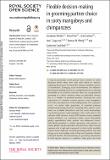Flexible decision-making in grooming partner choice in sooty mangabeys and chimpanzees
Abstract
Living in permanent social groups forces animals to make decisions about when, how and with whom to interact, requiring decisions to be made that integrate multiple sources of information. Changing social environments can influence this decision-making process by constraining choice or altering the likelihood of a positive outcome. Here, we conceptualized grooming as a choice situation where an individual chooses one of a number of potential partners. Studying two wild populations of sympatric primate species, sooty mangabeys (Cercocebus atys atys) and western chimpanzees (Pan troglodytes verus), we tested what properties of potential partners influenced grooming decisions, including their relative value based on available alternatives and the social relationships of potential partners with bystanders who could observe the outcome of the decision. Across 1529 decision events, multiple partner attributes (e.g. dominance ranks, social relationship quality, reproductive state, partner sex) influenced choice. Individuals preferred to initiate grooming with partners of similar global rank, but this effect was driven by a bias towards partners with a high rank compared to other locally available options. Individuals also avoided grooming partners who had strong social relationships with at least one bystander. Results indicated flexible decision-making in grooming interactions in both species, based on a partner's value given the local social environment. Viewing partner choice as a value-based decision-making process allows researchers to compare how different species solve similar social problems.
Citation
Mielke , A , Preis , A , Samuni , L , Gogarten , J F , Wittig , R M & Crockford , C 2018 , ' Flexible decision-making in grooming partner choice in sooty mangabeys and chimpanzees ' , Royal Society Open Science , vol. 5 , no. 7 , 172143 . https://doi.org/10.1098/rsos.172143
Publication
Royal Society Open Science
Status
Peer reviewed
ISSN
2054-5703Type
Journal article
Description
A.M., A.P., L.S., C.C. and R.M.W. were supported by the Max Planck Society; A.M. was supported by the Wenner Gren Foundation (grant no. 9095); A.P. was supported by the Leakey Foundation; L.S. was supported by the Minerva Foundation; J.F.G. was supported by an NSF Graduate Research Fellowship (DGE-1142336), the Canadian Institutes of Health Research's Strategic Training Initiative in Health Research's Systems Biology Training Program, an NSERC Vanier Canada Graduate Scholarship (CGS) and a long-term Research Grant from the German Academic Exchange Service (DAAD-91525837-57048249). C.C. was supported by the European Research Council (ERC) under the European Union's Horizon 2020 research and innovation programme (grant agreement no. 679787). Research at the Taï Chimpanzee Project has been funded by the Max Planck Society since 1997.Collections
Items in the St Andrews Research Repository are protected by copyright, with all rights reserved, unless otherwise indicated.

